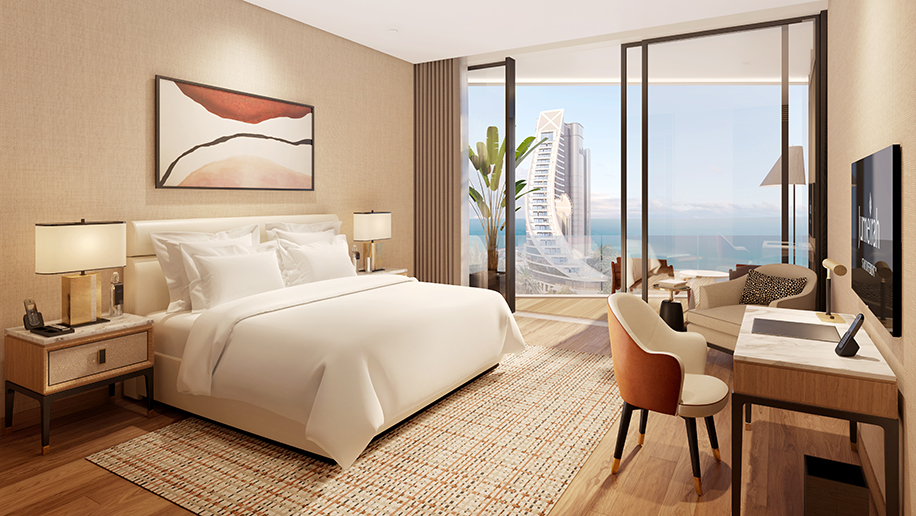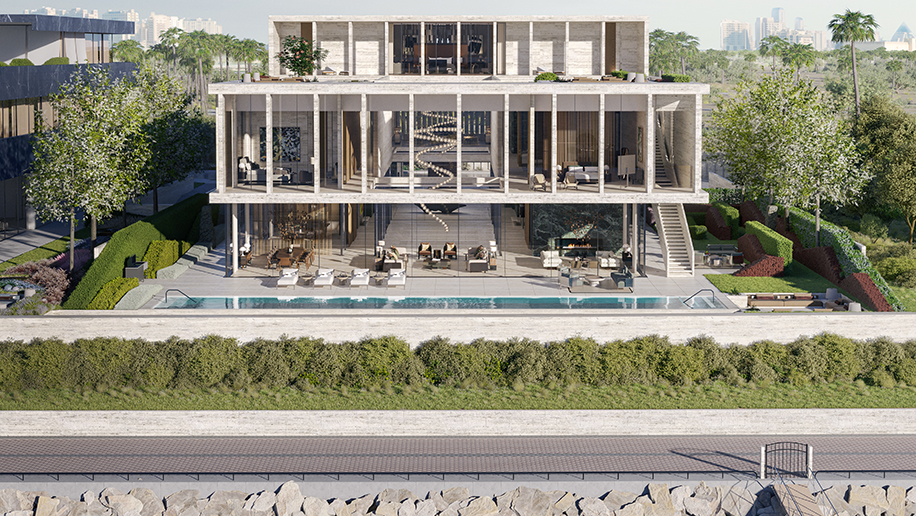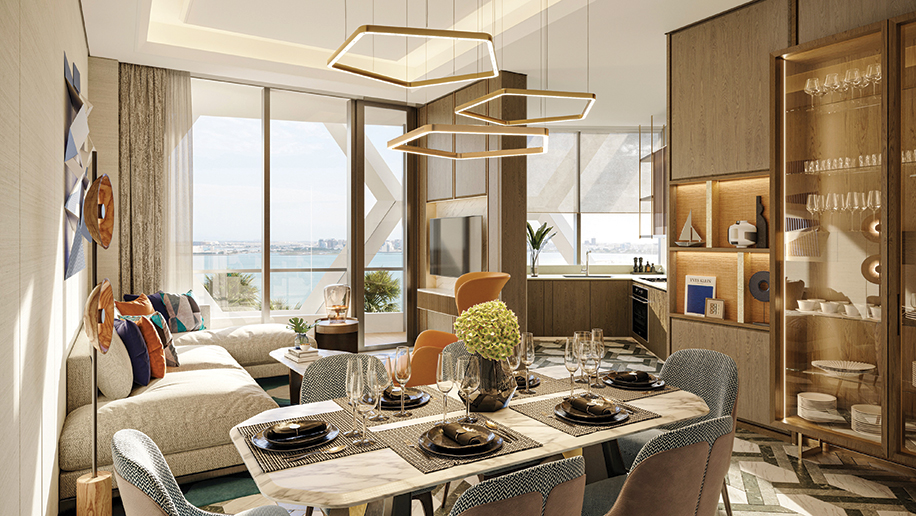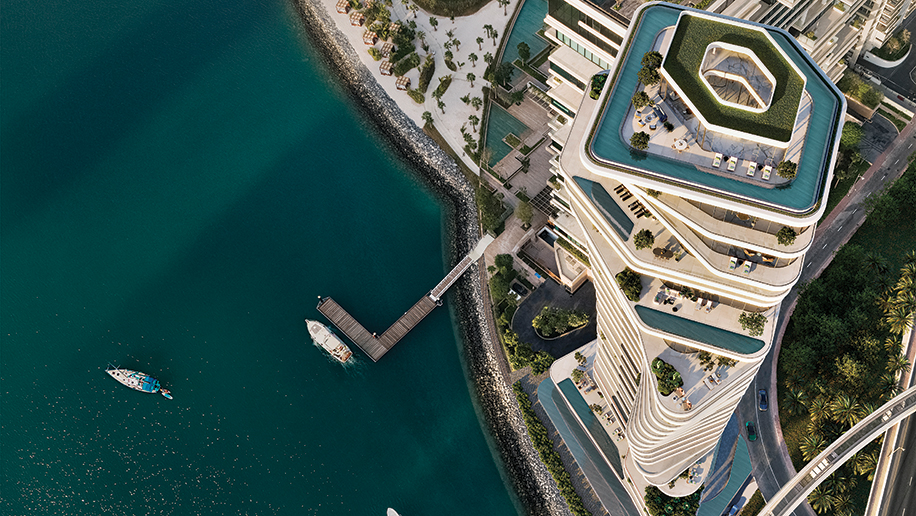
There has been an unprecedented explosion in demand for branded residences. According to a Knight Frank report, there were Dhs25.4 billion worth of sales of branded residences in Dubai alone in 2022 – a staggering 80 per cent year-on-year increase. It added that around 2,000 units are expected to enter the market this year alone.
While the likes of Porsche, Cavalli and Trump are all heavyweights in the branded real estate segment, there have been a number of high-end hotel brands rushing to make a big splash of their own. “Within the UAE, particularly in Dubai, a city often regarded as the epicentre of the global branded residences market, a total of 92 branded residences schemes can be found. The majority – 62 – are under the management of distinguished hotel brands. Moreover, the Dubai landscape showcases the involvement of no fewer than 25 hospitality brands that have embarked on creating schemes for branded residences,” says Elias Hannoush, founder and CEO of Morgan’s International Realty, a Dubai-based luxury real estate brokerage firm.
“Our latest report for the first half of 2023 reveals that transactions related to hotel-managed branded residences in Dubai have recorded substantial activity, totalling 2,579. These transactions commanded a cumulative value of Dhs14.72 billion for the period spanning from January to June 2023. The average price per square foot for hotel-managed branded residences stood at Dhs3,157 per sq ft during this period,” adds Hannoush.
Of course, that price per square foot indicates a conservative estimate when you consider what some of the most high-profile deals have secured this year. At the start of 2023, a nine-bedroom penthouse at the 27-storey Bulgari Lighthouse developed by Meraas – located on the Jumeirah Bay Island near the Bulgari Resort – sold for US$112 million making it the most expensive apartment in Dubai.
But if the city does one thing consistently, it is to ensure that records exist only to be broken. A few months after the Bulgari Lighthouse sale, the Dubai-headquartered Jumeirah Group confirmed staggering sales prices for its branded residences at the upcoming Jumeirah Marsa Al Arab property located close to the Burj Al Arab. The private sale at the Jumeirah Marsa Al Arab included four penthouses and 17 residences at the property, with the top floor penthouse selling for a phenomenal US$115 million thereby locking in a price per square foot of more than US$4,200. The penthouse which spans more than 27,000 sq ft and includes a private pool became the most expensive apartment sold in Dubai.
Katerina Giannouka, chief executive officer of Jumeirah Group, says, “Jumeirah is committed to expanding its portfolio of branded residences. Our residences at Jumeirah Marsa Al Arab are clearly an attractive proposition for our investor audience and we are delighted to bring such unique residential concepts that redefine the art of luxury living to Dubai’s landscape.”

While homegrown hospitality brands such as Jumeirah and Address Hotels and Resorts have plenty of branded residences in the UAE, other major international hospitality players including the likes of Accor and Marriot are racing ahead with projects of their own too.
Marriott entered the branded residences market a little under two-and-a-half decades ago. “The company opened its first branded residences in 2000 under The Ritz-Carlton brand and has been expanding this area of the business ever since. Today, we are the world’s largest branded residential company in the lodging industry with 129 open branded residences and 100 projects in the pipeline. Of the combined 229 projects, 180 projects are within our luxury segment across brands such as The Ritz-Carlton, St. Regis, W, EDITION, JW Marriott, and The Luxury Collection. The remaining 49 projects are within our premium segment across brands such as Marriott, Autograph Collection, Westin, Sheraton, Le Meridien and Renaissance,” observes Jaidev Menezes, regional vice president of Mixed-Use Development for EMEA at Marriott International.
Marriott has within that time frame cast a wide net with its branded residences offering across the region. These include a mix of standalone residences as well as those co-located alongside a hotel. Key examples of standalone Marriott branded residences in Dubai include The St. Regis Residences, Downtown Dubai being developed by Emaar as well as The Ritz-Carlton Residences, Dubai, Creekside which includes penthouses, residences and mansions – each mansion in the latter project is valued at approximately US$54 million and has a private mooring for up to 120ft yachts.

Examples of co-located residences in the region are The Residences at The St. Regis Al Mouj Muscat which is still under development, with Oman Sotheby’s International Realty being commissioned as the exclusive sales agent for the property. It includes 169 units ranging from one-bedroom apartments to four-bedroom duplex units. The Ritz-Carlton Residences, Amman is another example of a co-located residences project wherein owners can avail of the hotel’s facilities including its 24-hour concierge services and in-residence dining facility. Jordan also happens to be the first country in the Middle East where Marriott introduced its branded residences concept a few years ago. “We marked our first branded residence in the Middle East with the debut of W Hotels in Jordan in 2017. We operate 24 branded residences in EMEA across St. Regis, Bulgari, W, and The Ritz-Carlton, and we operate seven branded residences in the Middle East. In the past 24 months, we have signed seven residential projects in the region under our premium brands and have a total pipeline in EMEA of 32 projects,” adds Menezes.
Another hospitality major that has now doubled down on its branded residences component is Accor. Although Accor has been active in this sector for the past two decades creating residences under its many brands including Raffles, Fairmont and SLS, it is only earlier this year during an organisational restructure that it created Accor One Living – a platform that integrates hospitality solutions into mixed-use developments. “We created Accor One Living to bring together specialised project teams comprised of cross-functional experts who view mixed-use developments from the perspectives of both hotels and branded residences, supporting each phase in the total project life cycle. The same team which supports the initial planning, continues through the marketing phase, the operating phase, and so on – ensuring the original vision is realised,” explains Daniel Von Barloewen, vice president of Accor One Living, Head of Mixed-Use for the EMEA region.

Daniel is bullish not only about the growth of the branded residences segment, but also the demand for it. “To give you a sense of the escalation in demand, around the world the branded residential space is one of the fastest growing sectors in real estate. Accor has some 40 branded residence communities currently operating globally, with another more than 100 projects under development, across 24 distinct brand collections. By 2027, we expect to have more than 150 branded residences in operation, an increase of more than 300 per cent.
“Dubai is one of our strongest markets for branded residences. In addition to our two residences in operation, under the Fairmont and SLS brands, we have new residences underway at Fairmont Dubai Skyline, SO/ Uptown Dubai Residences, SLS Residences Palm Jumeirah (the first standalone SLS Residences outside of the Americas), Rixos Residences Dubai Islands, and Mama Shelter Residences Business Bay. We will have several more to announce in the coming months,” notes Daniel.
Accor partnered with RSG Group of Companies for the Fairmont Dubai Skyline project, the construction of which is expected to be completed by next year. Rising 226m off the ground, the Fairmont Dubai Skyline tower located on Sheikh Zayed Road will feature 181 hotel rooms and suites as well as 121 one-four bedroom residences across its 54 floors.
Not far from Skyline, Accor’s joint venture partner Ennismore opened its first SO/ branded property in the Middle East a few weeks ago. SO/ Uptown Dubai in DMCC’s Uptown has 188 rooms and suites. However, the top 28 floors of the tower feature 227 branded residences ranging from one-three bedroom apartments, as well as duplexes and a penthouse. This property is also the very first example of SO/ branded residences anywhere in the world.
Beyond Dubai and the UAE, Accor’s key branded residences in the GCC include Swissôtel Residences Doha, Qatar which will open next year and will be the first Swissôtel Residences in the entire GCC region, as well as the ultra-luxury Raffles Residences Jeddah which is the first Raffles Residences to open in Saudi Arabia and is scheduled to do so next year. Raffles Residences Jeddah is spread across 48 floors and is located adjacent to the Raffles Hotel Jeddah. The residences have a selection of three-five bedroom units with a minimum size of 375sqm. “Expectations for the Middle East are particularly optimistic, with an anticipated 86 per cent increase in the [branded residences] market by 2023. Notably, Saudi Arabia is poised for significant growth, driven by ambitious projects in cities like Jeddah and Riyadh. These cities and projects are strategically incorporating branded residences into their development plans, initially featuring renowned hotel brands. According to the 2023 Knight Frank Saudi Arabia report, there is substantial demand for branded residences in the country, with 55 per cent of high-net-worth individuals expressing a strong desire to acquire such properties,” says Mohamad Rabih Itani, partner Residential Sales and Marketing Projects at Knight Frank.
Marriott’s Menezes seconds Itani’s assessment of the Middle East being among the most important growth markets for branded residences globally. He says that for Marriott, 75 per cent of its branded residences pipeline is outside the US. “Emerging markets in Asia and the Middle East with high levels of economic growth and wealth generation are appealing to high-net-worth buyers looking for a primary or secondary residence. Across the Middle East, including Egypt, branded residences represent a significant portion of our development pipeline for the region, and we continue to see more growth potential in this area. Key growth markets include the UAE, Saudi Arabia and Egypt and we also continue to see potential for branded residences in markets like Qatar and Oman. Saudi Arabia is seeing massive redevelopment across all asset classes, which in turn will create significant demand for hotels, resorts and branded residences,” says Menezes.
Apart from hospitality brands making a case for their branded residences, property developers too are seeing the benefits of partnering with hospitality brands. Several of them are running such projects concurrently. In the case of UAE-based Omniyat, it has teamed up with Dorchester Collection for multiple projects across Dubai. The first among them to open will be The Lana, Dorchester Collection’s luxury hotel in Dubai’s Business Bay district. While the hotel will have 225 rooms and suites, it will be connected to a residential tower that will have 39 serviced apartments which were reportedly sold in advance of their construction, but which can command current prices of around Dhs7,000 per sqft. Close to it is another project, Vela, which will consist of 38 residences overlooking Marasi Marina that is furnished and designed by Gilles and Boissier.
Across the city, on the Palm Jumeirah in Dubai, two more Omniyat x Dorchester Collection properties are being readied. Orla has 85 residences, three sky palaces and one 55,000 sqft mansion. The property also has a 150m stretch of private beach and additionally has its own bowling alley, private cinema and cigar lounge. The second property, perhaps one of the most exclusive to come out of the collaboration, is the Ava at Palm which has 17 freehold residences, each spread out across an entire floor of the building, and each with a private pool and terrace.

For investors in these branded apartments, the upsides are plenty. These include, as Morgan’s International’s Hannoush points out, the potential for buyers to generate rental income by leasing their properties when not in use, access to high-quality amenities and services offered by the associated hotel, concierge services, spa facilities, high-end dining options, and housekeeping, as well as appreciable capital gains over time since most of these projects are situated in prime locations. These residences are also turnkey investments as they typically come fully furnished. The presence of an established brand name backing the residence has the added advantage of the ease of resale should the investor want to sell. “For purchasers, owning a residence bearing one of our brands means greater assurance that they will have quality services at the ready such as concierge assistance, housekeeping, in-residence dining, spa and fitness facilities,” says Marriott’s Menezes.
However, it is important to recognise the potential downsides as well. “These residences often command a premium price compared to conventional real estate. Owners may also incur ongoing management and maintenance fees, which could impact rental income. Frequent personal use of the property might be constrained, especially during peak tourist seasons,” cautions Hannoush.
Knight Frank’s Itani also urges investors to be aware of both sides of the coin when deciding to invest in branded residences. “[Branded residences have] higher maintenance and security fees compared to regular projects. Unfortunately, a couple of years after handing over delivery, a lot of the projects fail to provide the promised service. This is why we always encourage clients to make sure to ask about the post-delivery management of the project,” says Itani.
If Knight Frank’s assessment of the growth potential of branded residences in the UAE as well as other major GCC markets is right, there’s much more to come. The likes of Four Seasons have seen an exceptional demand for its Private Residences in Dubai, Abu Dhabi, Bahrain and Cairo with buyers willing to buy off-plan to be associated with prestigious brand names.
The evolution of this sector, says Itani, could come across via several verticals. He says, “In the future, there may be a greater emphasis on mixed-use developments that combine hospitality-branded residences with other amenities, such as retail, entertainment, and office spaces. Also, technology will continue to play a significant role in the hospitality industry, and future branded residences could feature advanced smart home systems, virtual reality experiences, and seamless connectivity.”
The next time you check in to a luxury hotel and are swept by a fleeting wish that you won’t receive that dreaded call from reception asking to confirm your check-out time, remind yourself that there’s an absolute possibility that you could live – and own – the hotel life 24x7x365.












